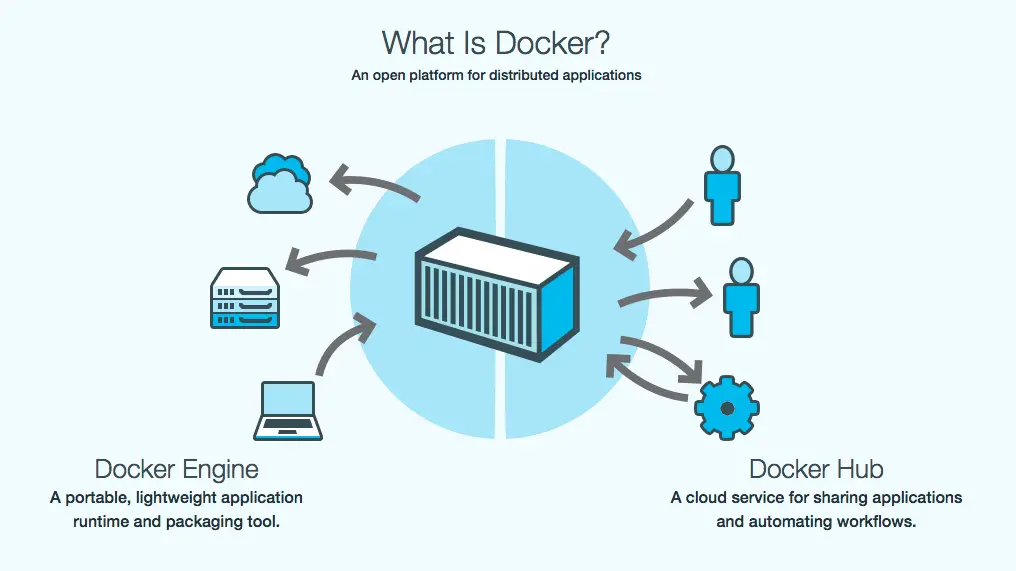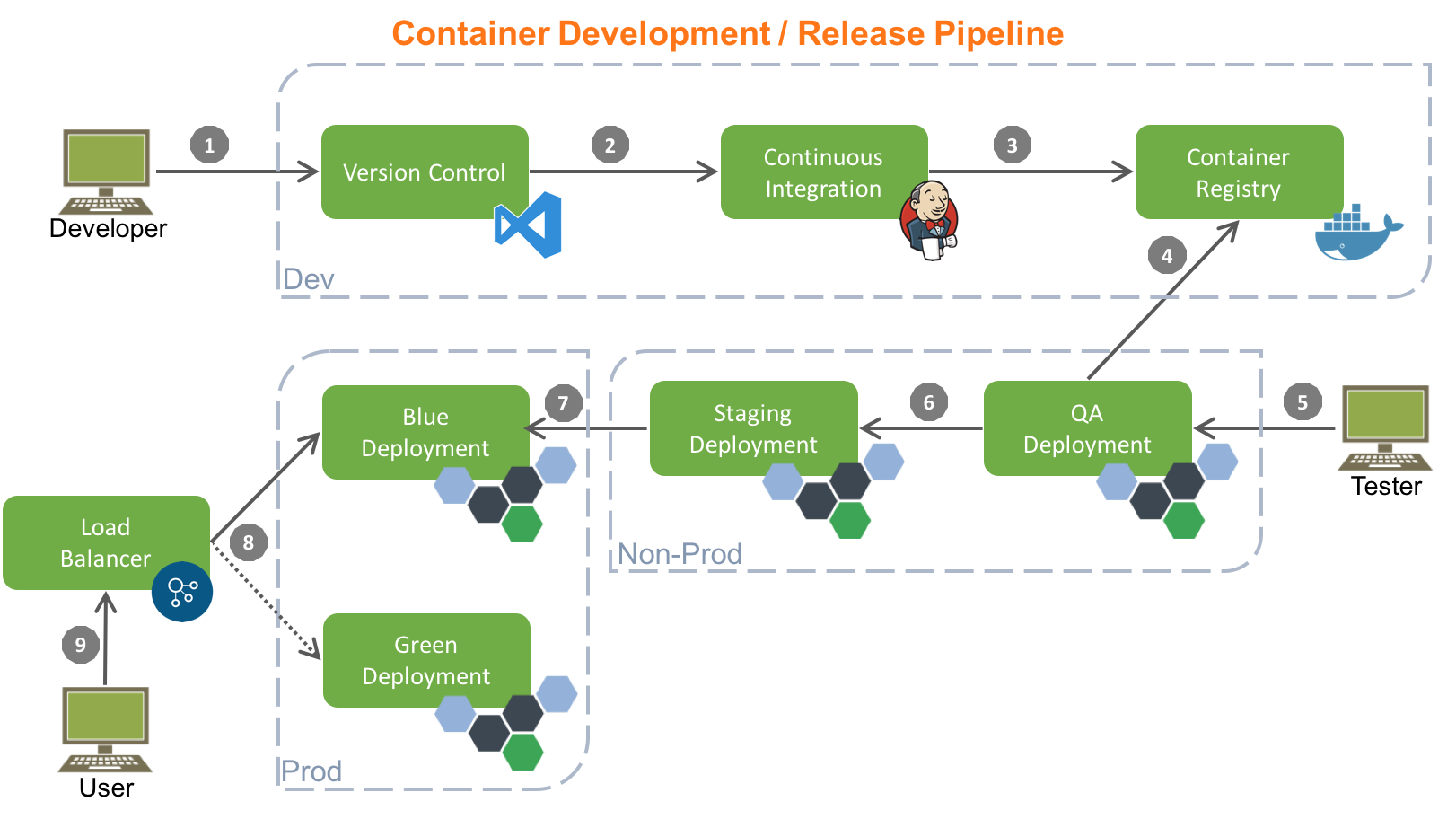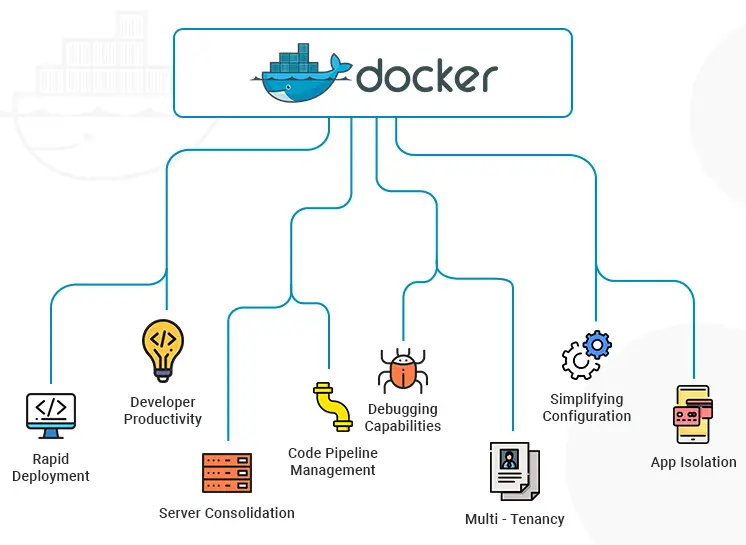The Role of Docker in Development and Deployment

Docker is a platform that allows developers to build, ship, and run distributed applications in a consistent environment. It uses container technology to package up code and all its dependencies so that it can run on any server without any additional setup.

Benefits of using Docker in development

There are many benefits to using Docker in development, including:
- Increased consistency: Docker ensures that your code will run the same way on every machine, regardless of the operating system or hardware. This can help to reduce the number of errors that occur during development and deployment.
- Faster development: Docker makes it easy to quickly spin up new environments for testing and development purposes. This can help to speed up the development process and make it more efficient.
- Improved collaboration: Docker makes it easy for developers to share code and collaborate on projects. This can help to improve the quality of code and make it easier to work together.
Benefits of using Docker in deployment
There are also many benefits to using Docker in deployment, including:
- Increased reliability: Docker helps to ensure that your applications will run reliably in production. This is because Docker containers are isolated from the underlying infrastructure, so they are not affected by changes to the host system.
- Reduced downtime: Docker makes it easy to quickly roll out updates to your applications. This can help to reduce downtime and keep your application running smoothly.
- Improved scalability: Docker makes it easy to scale your applications up or down as needed. This can help to ensure that your application can handle the load, even during peak periods.
Overall, Docker is a powerful tool that can help you to improve the development and deployment of your applications. It can help to increase consistency, speed up development, and improve collaboration. It can also help to ensure that your applications run reliably in production, reduce downtime, and improve scalability.## The Role Of Docker In Development And Deployment
Docker is a containerization platform that helps developers build, ship, and run applications consistently across any infrastructure. It provides an isolated environment for applications, allowing them to run independently of the underlying system. Docker has become increasingly popular in recent years as it simplifies the development and deployment process and improves application portability.
Introduction
Docker is an efficient tool for developing, deploying, and running applications in a consistent and efficient manner. It offers a wide range of benefits, including:
- Faster development cycles: Docker allows developers to quickly build and test applications without having to worry about setting up the entire environment.
- Simplified deployment: Docker containers can be easily deployed to any environment, whether it’s on-premises or in the cloud.
- Improved application portability: Docker containers can be moved between different environments without requiring any code changes.
- Increased security: Docker containers provide an additional layer of security by isolating applications from the underlying system.
Key Features of Docker
Docker offers several essential features that make it an ideal choice for developers and DevOps teams:
- Containerization: Docker containers bundle applications and their dependencies together in a single package. This simplifies development and deployment, as developers no longer need to worry about installing and configuring dependencies separately.
- Isolation: Docker containers isolate applications from the underlying system, making them more secure and ensuring that they will run the same way on any platform.
- Portability: Docker containers can be easily moved between different environments, whether it’s a physical server, a virtual machine, or a cloud platform.
- Composition: Docker containers can be composed together to create complex applications. This allows developers to build applications from smaller, manageable components.
Benefits of Using Docker
Organizations can gain several benefits by implementing Docker in their development and deployment processes:
- Increased productivity: Docker’s ease of use and automation capabilities can help development teams to increase their productivity.
- Reduced costs: Docker can help organizations to save money by reducing the need for physical servers and the costs associated with maintaining them.
- Improved agility: Docker’s ability to isolate and containerize applications makes it easier for businesses to innovate quickly and adapt to changing requirements.
- Increased security: Docker containers provide an additional layer of security by isolating applications from the underlying system and preventing unauthorized access.
Use Cases of Docker
Docker has a wide range of use cases, including:
- Application development: Docker is commonly used for developing and testing applications as it allows developers to isolate different parts of their application and work on them independently.
- Microservices architecture: Docker can simplify the development and deployment of microservices architectures as it provides a consistent way to package and deploy individual microservices.
- Continuous integration and continuous delivery (CI/CD): Docker can be integrated with CI/CD pipelines to streamline the development and deployment process.
- Cloud computing: Docker is widely used in cloud computing environments as it allows applications to be easily deployed and scaled across multiple cloud platforms.
Conclusion
Docker has emerged as a revolutionary tool that has transformed the way applications are developed, shipped, and deployed. Its ease of use, performance benefits, and ecosystem of tools have made it a popular choice for developers, DevOps teams, and enterprise organizations alike. By leveraging the power of Docker, organizations can achieve faster development cycles, ensure consistent deployments, simplify application portability, enhance security, and meet the demands of modern application landscapes.
Keywords
Docker container, DevOps, application development, containerization, portability, security
FAQs
1. What is Docker?
Docker is a containerization platform that allows developers to package and isolate applications together with their dependencies into a single package.
2. Why should I use Docker?
Docker can simplify development, improve application portability, and ensure consistent deployments across different environments.
3. Is Docker only used for application development?
No, Docker can also be used for cloud computing, microservices architecture, and CI/CD pipelines.
4. Is Docker secure?
Yes, Docker containers provide an additional layer of security by isolating applications from the underlying system and preventing unauthorized access.
5. What are the key features of Docker?
Docker’s key features include containerization, isolation, portability, and composition, making it an efficient tool for developing and deploying applications.

Docker is a great tool for developing and deploying applications. It makes it easy to package your applications and their dependencies into a single, portable, and executable package. This makes it easier to develop, test, and deploy applications across different environments.
Docker is a piece of crap. It’s slow, buggy, and unreliable. I’ve wasted hours trying to get it to work, and it’s still not working. I would not recommend using Docker to anyone.
Docker is a powerful tool that can simplify the development and deployment of applications. It is easy to use and can be used on a variety of platforms. If you are looking for a way to make your development and deployment process more efficient, then Docker is a good option to consider.
I agree with George. Docker is a great tool for developing and deploying applications. It makes it easy to package your applications and their dependencies into a single, portable, and executable package. This makes it easier to develop, test, and deploy applications across different environments.
I disagree with George. Docker is a piece of crap. It’s slow, buggy, and unreliable. I’ve wasted hours trying to get it to work, and it’s still not working. I would not recommend using Docker to anyone.
I’m not sure what all the fuss is about. Docker is just a tool. It has its pros and cons, like any other tool. I’ve used it before, and it worked fine for me. I don’t think it’s fair to say that it’s a piece of crap.
I have to agree with Robert. Docker is just a tool. It’s not perfect, but it’s not a piece of crap either. I’ve used it before, and it’s worked well for me. I think it’s a good option for developing and deploying applications.
Docker is like a magic wand for developers. It makes it so easy to develop and deploy applications. I’ve used it before, and it’s worked like a charm. I would recommend it to anyone.
I’m not sure I agree with Michael. Docker is a great tool, but it’s not a magic wand. It has its pros and cons, like any other tool. I’ve used it before, and it’s worked well for me, but I’ve also had some problems with it. I think it’s important to be aware of both the pros and cons before you decide whether or not to use it.
I’m with Sarah. Docker is a great tool, but it’s not perfect. I’ve used it before, and it’s worked well for me, but I’ve also had some problems with it. I think it’s important to be aware of both the pros and cons before you decide whether or not to use it.
I agree with Sarah and Amy. Docker is a great tool, but it’s not perfect. I’ve used it before, and it’s worked well for me, but I’ve also had some problems with it. I think it’s important to be aware of both the pros and cons before you decide whether or not to use it.
I’m not sure I agree with Jason. Docker is a great tool, and I’ve never had any problems with it. I’ve used it before, and it’s worked like a charm. I would recommend it to anyone.